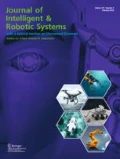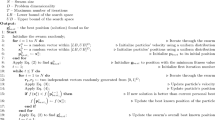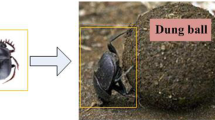Abstract
Many real-world problems are dynamic optimization problems in which the optimal solutions need to be continuously tracked over time. In this paper a multi-population based univariate marginal distribution algorithm (MUMDA) is proposed to solve dynamic optimization problems. The main idea of the algorithm is to construct several probability models by dividing the population into several parts. The objective is to divide the search space into several regions to maintain the diversity. Concretely, MUMDA uses one probability vector to do the search in the promising areas identified previously, and uses other probability vectors to search for new promising optimal solutions. Moreover the convergence of univariate marginal distribution algorithm (UMDA) is proved, which can be used to analyze the validity of the proposed algorithm. Finally, the experimental study was carried out to compare the performance of several UMDA, and the results show that the MUMDA is effective and can be well adaptive to the dynamic environments rapidly.
Similar content being viewed by others
References
Jin, Y., Branke, J.: Evolutionary optimization in uncertain environments-a survey. IEEE Trans. Evol. Comput. 9(3), 1–15 (2005)
Cartwright, H.M., Tuson, A.L.: Genetic algorithms and flowshop scheduling: towards the development of a real-time process control system. In: Proc. of the AISB Workshop on Evolutionary Computing, pp. 277–290. Morgan Kaufmann Publishers, San Francisco (1994)
Cobb, H.G.: An Investigation into the Use of Hypermutation as an Adaptive Operator in Genetic Algorithms Having Continuous, Time-Dependent Nonstationary Environment. Naval Research Laboratory, Washington (1990)
Grefenstette, J.J.: Genetic algorithms for changing environments. In: Parallel Problem Solving from Nature, Brussels, pp. 137–144 (1992)
Goldberg, D.E., Smith, R.E.: Nonstationary function optimization using genetic algorithms with dominance and diploidy. In: Proceeding of the 2nd International Conference on Genetic Algorithms, pp. 59–68. Lawrence Erlbaum Associates (1987)
Branke, J.: Memory enhanced evolutionary algorithms for changing optimization problems. In: Proc. of the Congress on Evolutionary Computation, pp. 1875–1882. IEEE Service Center, Piscataway (1999)
Oppacher, F., Wineberg, M.: The shifting balance genetic algorithm: improving the GA in a dynamic environment. In: Proceeding of Genetic and Evolutionary Computation, pp. 504–510. Morgan Kaufmann, San Francisco (1999)
Branke, J., Kaubler, T., Schmidt, C., et al.: A Multi-population Approach to Dynamic Optimization Problems, Adaptive Computing in Design and Manufacturing, pp. 299–308. Springer, Berlin (2000)
Ursem, R.K.: Multinational GA optimization technique in dynamic environments. In: Proceeding of Genetic and Evolutionary Computation, pp. 19–26. Morgan Kaufmann, San Francisco (2000)
Larranaga, P., Lozano, J.A.: Estimation of Distribution Algorithms: A New Tool for Evolutionary Computation. Kluwer, Norwell (2001)
Mühlenbein, H., Zinchenko, L., Kureichik, V., Mahnig, T.: Effective mutation rate for probabilistic models in evolutionary analog circuit design. In: Proceedings of the IEEE International Conference on Artificial Intelligence Systems, pp. 1987–1994 (2002)
Tang, M., Raymond Lau, Y.K.: A Hybrid estimation of distribution algorithm for the minimal switching graph problem. In: Proceedings of the International Conference on Computational Intelligence for Modeling, Control and Automation, and International Conference on Intelligent Agents, Web Technologies and Internet Commerce, pp. 259–264 (2005)
Bosman, P.A.N., Thierens, D.: Expanding from discrete to continuous estimation of distribution algorithms: the IDEA. In: Lecture Notes in Computer Science 1917: Parallel Problem Solving from Nature-PPSN VI, pp. 767–776 (2000)
Mühlenbein, H.: The equation for response to selection and its use for prediction. Evol. Comput. 5(3), 303–346 (1997)
Zhang, Q., Mühlenbein, H.: On the convergence of a class of estimation of distribution algorithms. IEEE Trans. Evol. Comput. 8(2), 127–136 (2004)
Yang, S., Yao, X.: Experimental study on population-based incremental learning algorithms for dynamic optimization problems. Soft Comput. 9(6), 815–834 (2005)
Whitley, L.D.: Fundamental principles of deception in genetic search. Rawlins GJE Foundations of Genetic Algorithms 1(3), 221–241 (1991)
Back, T., Khuri, S.: An evolutionary heuristic for the maximum independent set problem. In: IEEE Conference Evolutionary Computation, pp. 531–535 (1994)
Author information
Authors and Affiliations
Corresponding author
Rights and permissions
About this article
Cite this article
Wu, Y., Wang, Y. & Liu, X. Multi-population Based Univariate Marginal Distribution Algorithm for Dynamic Optimization Problems. J Intell Robot Syst 59, 127–144 (2010). https://doi.org/10.1007/s10846-009-9392-0
Received:
Accepted:
Published:
Issue Date:
DOI: https://doi.org/10.1007/s10846-009-9392-0




